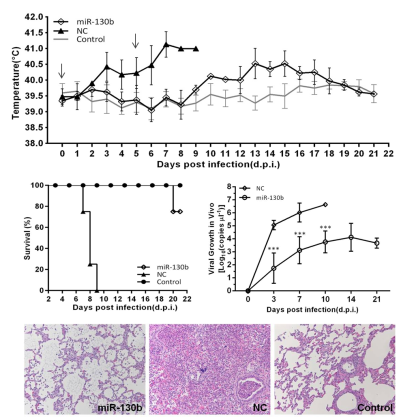
Recently, the lab of swine reproductive infectious diseases led by Dr. Tong Guangzhi at the Shanghai Veterinary Research Institute (SHVRI) of Chinese Academy of Agricultural Sciences (CAAS) identified miR-130b as a novel Porcine reproductive and respiratory syndrome virus (PRRSV) suppressor in vitro and in vivo. This finding has been published in the Scientific Reports on Nov. 19 2015 available here: http://www.nature.com/articles/srep17010.

PRRSV is one the most economically important viral pathogens in pigs. The significant economic losses to the swine industry have stimulated searches for new ways to control PRRSV transmission. Meanwhile, microRNAs can impact viral infections by binding to sequences on viral RNA transcripts, usually resulting in the repression of virus replication. The researchers found that the delivery of multiple miR-130 family mimics, especially miR-130b, resulted in inhibition of PRRSV replication in vitro. Intranasal inoculation of piglets with miR-130b exhibited antiviral activity in vivo and partially protected piglets from an otherwise lethal challenge with Highly Pathogenic PRRSV strain.
Overall, the study reveals an example of an microRNA that modulates PRRSV replication and also highlights a host factor that could be used for RNAi-mediated antiviral therapeutic strategies.
This work was supported by the grants from the National Basic Research Program (973 Plan) (2014CB542700), the National Natural Science foundation of China (31302098, 31300140), and the National Key Technology Support Program (2015BAD12B01-1).
Issued at http://www.nature.com/articles/srep17010

